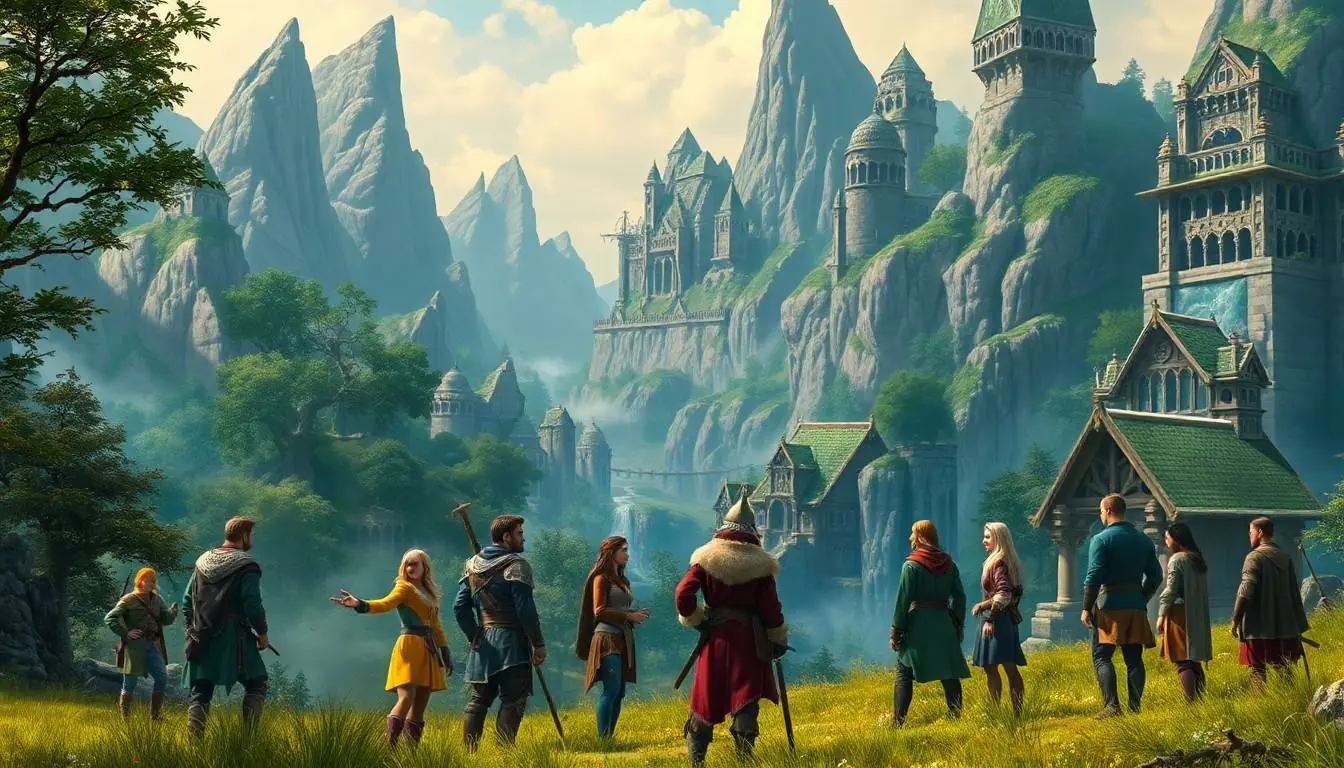In a world where graphics get shinier and gameplay gets faster, old MMORPGs stand as nostalgic giants, inviting players to dust off their virtual swords and revisit epic quests. Remember the thrill of grinding for hours just to level up or the camaraderie forged in pixelated taverns? Those were the days when a laggy internet connection could turn a heroic raid into a slapstick comedy.
These classic games weren’t just about slaying dragons; they were about building communities, crafting stories, and sometimes, accidentally walking off cliffs. As players reminisce about the pixelated landscapes and quirky characters, it’s clear that old MMORPGs hold a special place in the hearts of many. So grab your favorite energy drink and prepare for a trip down memory lane, where every quest was an adventure and every login felt like coming home.
Table of Contents
ToggleOverview Of Old MMORPGs
Old MMORPGs played a crucial role in shaping the gaming landscape. They introduced expansive worlds filled with quests, dungeons, and rich lore. Players engaged in social interactions, forging alliances and friendships while navigating these vast environments. Classic titles like EverQuest and World of Warcraft became cultural phenomena, attracting millions of players worldwide.
Character progression defined the experience in these games. Grinding for levels became a shared endeavor, with players dedicating hours to enhance their abilities and gear. Unique classes, each with its strengths and weaknesses, created diverse gameplay options and team dynamics. Strategy played a vital role, especially in group quests and raids where coordination proved essential.
Community-building emerged as a hallmark of old MMORPGs. Guilds formed, fostering camaraderie and support among players. Players often gathered for in-game events or simply to socialize, establishing bonds that transcended the virtual world. Many friendships born in these environments continued long after the games faded from popularity.
Storytelling within these MMORPGs captivated players. Quests often unveiled intricate narratives, drawing players into immersive worlds. Players experienced epic battles, emotional story arcs, and moral dilemmas that added depth to their adventures. Engaging lore provided context to the quests, enhancing the overall experience.
The technical limitations of earlier MMORPGs added charm to the gameplay. Players adapted to lag, graphics that aged poorly, and bugs that sometimes offered unintentional humor. These challenges amplified the sense of achievement when overcoming obstacles, reaffirming the communal spirit shared among players.
These elements combined to create lasting memories for many. Nostalgia continues to fuel interest in old MMORPGs, and players fondly look back on the adventures and friendships formed during these formative gaming years.
Key Features Of Old MMORPGs
Old MMORPGs stand out for their distinctive characteristics that captivated players. Notably, immersive worlds and player interactions defined the experience.
Immersive Worlds
Expansive landscapes filled old MMORPGs with quests, dungeons, and lore. Players ventured through vibrant environments that encouraged exploration and discovery. Iconic examples like EverQuest created diverse terrains, from enchanted forests to treacherous mountains. Each zone featured its own set of challenges and stories, enticing players to delve deeper. Richly crafted narratives enhanced the sense of immersion, making players feel invested in their avatars’ journeys. Environments served as more than mere backdrops; they were vital components of the gaming experience, allowing players to lose themselves in intricate details. Players formed emotional connections with these worlds, nurturing a sense of nostalgia that endures today.
Player Interaction
Player interaction thrived in old MMORPGs, fostering community bonds that became integral to gameplay. Communication became essential for success as players joined forces to tackle formidable enemies. Guilds developed as major social structures, providing support networks and collaborative opportunities. Socializing through in-game events and chat features encouraged friendships that transcended the virtual realm. Players shared tips and strategies, enhancing their collective gaming experience. Cooperative quests required teamwork, making collaboration paramount. These interactions fostered a sense of belonging, allowing players to forge alliances that sometimes lasted for years. In many ways, the community spirit was a defining aspect of these classic games, enhancing engagement and enriching the overall experience.
Popular Old MMORPGs
Old MMORPGs evoke a sense of nostalgia, with titles like EverQuest and World of Warcraft standing out in players’ memories. These games created memorable worlds filled with adventure and community.
Game 1: EverQuest
EverQuest launched in 1999, defining the MMORPG genre. Players immersed themselves in Norrath, a vast world brimming with quests. Various classes and races offered unique gameplay options. The game fostered friendships through guilds and cooperative raids, where teamwork was essential for overcoming challenges. EverQuest’s depth in lore captivated players, creating a sense of belonging. Character progression encouraged dedication as players aimed to enhance abilities and gear. The game’s complexity combined with social interactions crafted enduring memories for many.
Game 2: World of Warcraft
World of Warcraft debuted in 2004, rapidly gaining popularity and changing the gaming landscape. Its expansive world, Azeroth, featured diverse regions, engaging quests, and vibrant lore. Players could select from numerous races and classes, tailoring their gaming experience. The introduction of battlegrounds and arenas added competitive elements, drawing in players seeking PvP action. Raiding became a hallmark of WoW, demanding coordination and strategy among participants. Community engagement thrived through guilds, fostering long-lasting friendships and rivalries. The game set a benchmark for future MMORPGs, leaving a lasting legacy in the gaming industry.
The Impact Of Old MMORPGs
Old MMORPGs left an indelible mark on the gaming landscape. Social interactions thrived in these early games, enabling players to form communities that extended beyond the confines of their screens. Notably, classic titles like EverQuest and World of Warcraft served as cultural phenomena, setting the standard for multiplayer experiences.
Immersive worlds defined these games. Players explored vast terrains brimming with quests and engaging lore, which encouraged continuous exploration. The intricacy of narratives allowed for deep emotional connections, as players invested in their characters’ journeys.
Teamwork became essential, particularly through guilds and cooperative quests. These social structures fostered camaraderie, offering support networks among players. Friendships forged in gaming lobbies often lasted long after players logged off, enriching social experiences.
Character progression played a vital role in the addiction of old MMORPGs. Players dedicated hours to improving abilities and acquiring better gear, which fueled motivation to delve deeper into the game. Unique character classes provided diverse gameplay options, catering to a wide range of player preferences.
Technical limitations contributed their charm, highlighting the humor found in gameplay hiccups. Lag and glitches became shared experiences, often sparking lighthearted conversations among players. The nostalgia evoked by these moments continues to resonate with fans, inviting them to reconnect with cherished memories.
Ultimately, the impact of old MMORPGs resonates today. Many players still yearn for the sense of community and adventure those classic games provided. This legacy continues to influence modern game design, reinforcing the importance of social interactions and storytelling in multiplayer experiences.
Conclusion
The legacy of old MMORPGs remains a powerful force in the gaming community. They not only shaped the genre but also created lasting memories for players who formed friendships and shared adventures. The blend of immersive worlds and engaging narratives fostered a sense of belonging that many still cherish today.
As modern games evolve, the influence of these classic titles continues to inspire developers to prioritize community and storytelling. The charm of overcoming technical limitations and the joy of character progression evoke nostalgia that keeps players returning to these beloved virtual realms. Old MMORPGs will always hold a special place in the hearts of gamers, reminding them of the magic that first drew them into online worlds.






